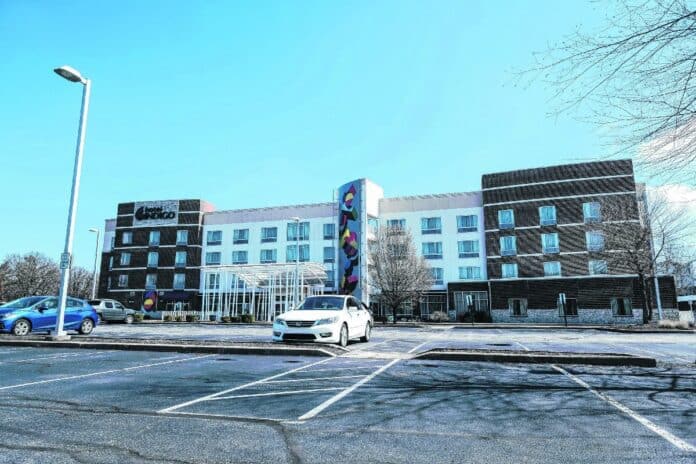
Don’t expect to see “no vacancy” signs any time soon.
Consequences of the COVID-19 pandemic crisis, including travel restrictions and stay-at-home orders, are placing most hotels and motels throughout south central Indiana in long-term financial peril.
Just last week, Bartholomew County lost $368,000 in hotel rental sales when compared with the same week last year, Columbus Area Visitors Center Executive Director Karen Niverson said.
For the week of March 15-21, the motels and hotels in Bartholomew County had a 56% occupancy rating, according to reports issued on a weekly basis. As a result of low demand, occupancy rates have fallen from an average of $103 a night a year ago — to $88 a night last week — a drop of 14.3%, Niverson said.
[sc:text-divider text-divider-title=”Story continues below gallery” ]
“If you annualize that rate of loss, that is over $18 million in just our county,” Niverson said. “Let’s hope we see a recovery soon.”
Hotel layoffs
Lodgings are considered essential services under Indiana Gov. Eric Holcomb’s executive order issued on March 23.
Nevertheless, Hotel Indigo in downtown Columbus is now temporarily closed, said Cindy Waddle, regional manager for Dora Hotel Co., which includes the Indigo facility. The hotel at 400 Brown St., which had 44 employees prior at the beginning of the month, now has four workers, she said.
“We’re hoping for a May 1 reopening, but that depends on when travel resumes and if the restrictions are lifted,” Waddle said.
The reason why Hotel Indigo was closed is because its clientele of corporate and group travelers are all staying home, she said.
Another Dora property — Charwood Suites, located off Carr Hill Road — is sustaining itself because it rents lodgings for extended periods of time exceeding seven days, Waddle said.
A third hotel managed by Waddle is the new Columbus Holiday Inn, 2485 W. Jonathan Moore Pike. Due to its location just off Interstate 65, the Holiday Inn is still attracting customers such as snowbirds returning from Florida and normal passerbys, Waddle said. However, the number of business travelers is at a bare minimum, she said.
With a skeletal staff and limited amenities, it still makes economic sense to keep the Columbus Holiday Inn open, Waddle said.
But when all three lodgings owned by developer Tim Dora are put together, a total of 75 employees have been temporarily furloughed, Waddle said.
Seeking solutions
Last week, representatives of the American Hotel and Lodging Association asked the Trump administration for a $150 billion bailout. A local man who advocated for that effort was Nicholas Sprague, director of business development and general counsel for Sprague Hotel Developers.
In a letter sent to Congress, Sprague said he had experienced firsthand the tremendous impact the COVID-19 crisis has had on the hospitality industry.
“Numerous conventions and sporting events have all canceled, while corporate travel has ceased,” Sprague wrote. “After a weak winter, the hope of spring and summer seems bleak. We are reducing our workforce to minimal levels. We are cutting costs. However, there is only so much we can do.”
Final decisions regarding relief for business, including hotels and motels, have not yet been made by Congress.
The Sprague properties, located near I-65 near Edinburgh, are the Hilton Garden Inn, the Comfort Inn and the Holiday Inn Express and Suites.
Outlook
The three largest sectors of tourism — retail, restaurants and lodgings — had all taken devastating financial hits. But social service agencies and not-for-profit organizations may experience their own problems due to the declining hospitality industry, Iverson said.
“As we move forward, the festivals and events we host quite often serve the dual purpose of being fundraisers for nonprofits,” Niverson said. “Those kind of events are going to struggle.”
If lodgings are open today, that doesn’t necessary mean they stay open. The entire hospitality industry will have to keep reviewing their situation and make tough decisions in the months ahead on whether it makes sense to keep a hotel open with skeletal crews and limited amenities — or temporarily close until restrictions are lifted, Waddle said.
“I want to be optimistic that we’ll be able to salvage the last half of the year,” Niverson said. “But in tourism and travel, a lot of conferences, meetings and group tours that we host are planned months in advance. And that kind of planning just isn’t taking place right now.”
[sc:pullout-title pullout-title=”Hotel job loss in Indiana” ][sc:pullout-text-begin]
An analysis has been made of anticipated job losses in Indiana’s hotel and motel industry due to factors associated with the COVID-19 crisis.
Direct hotel operations jobs prior to the virus: 24,979
Anticipated loss of direct hotel operations jobs: 10,991
Total hotel-supported jobs prior to the virus: 109,908
Anticipated loss of total hotel-supported jobs: 44,855
These estimates were made by Oxford Economics, a British firm that provides quantitative analysis.
[sc:pullout-text-end]




